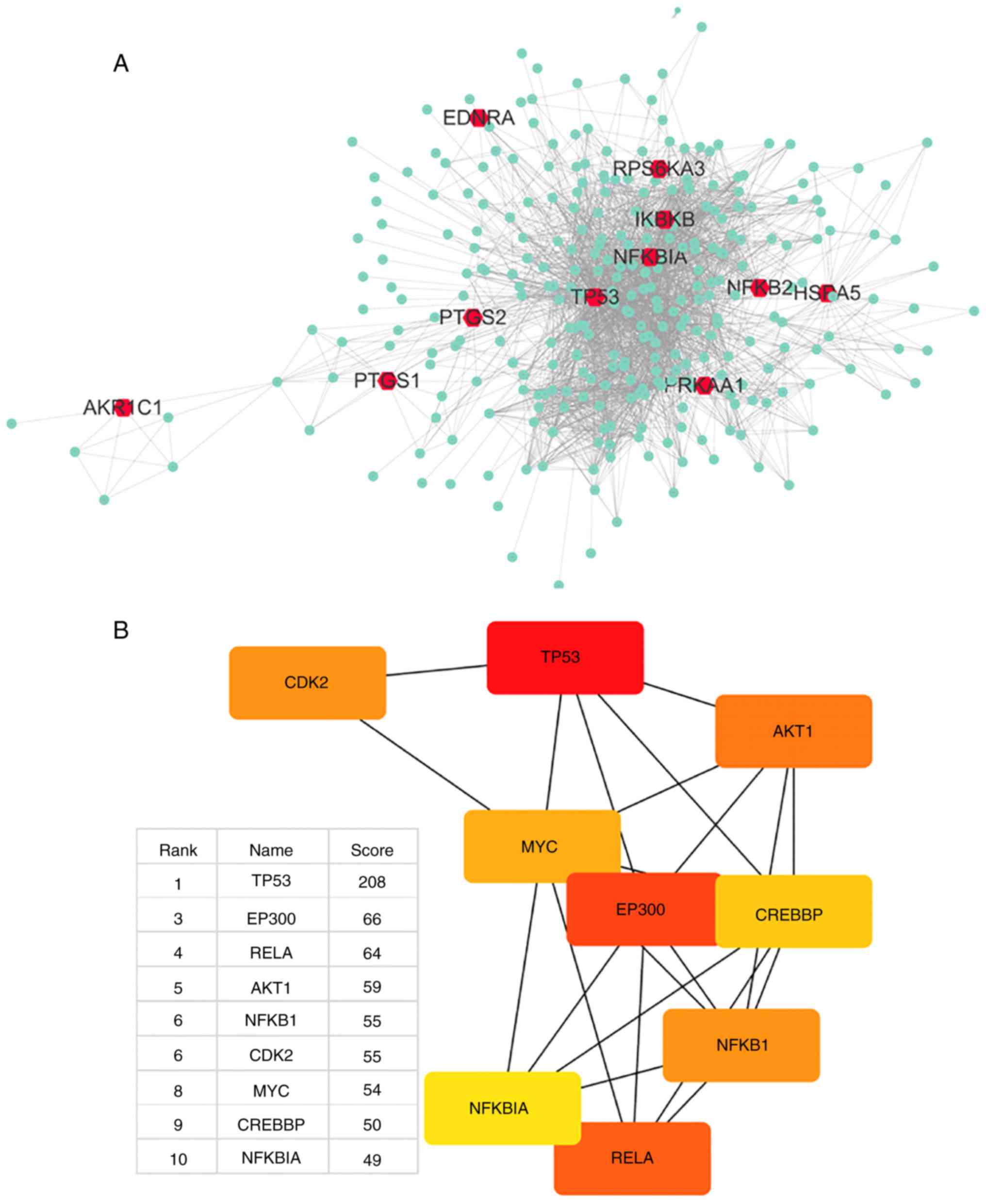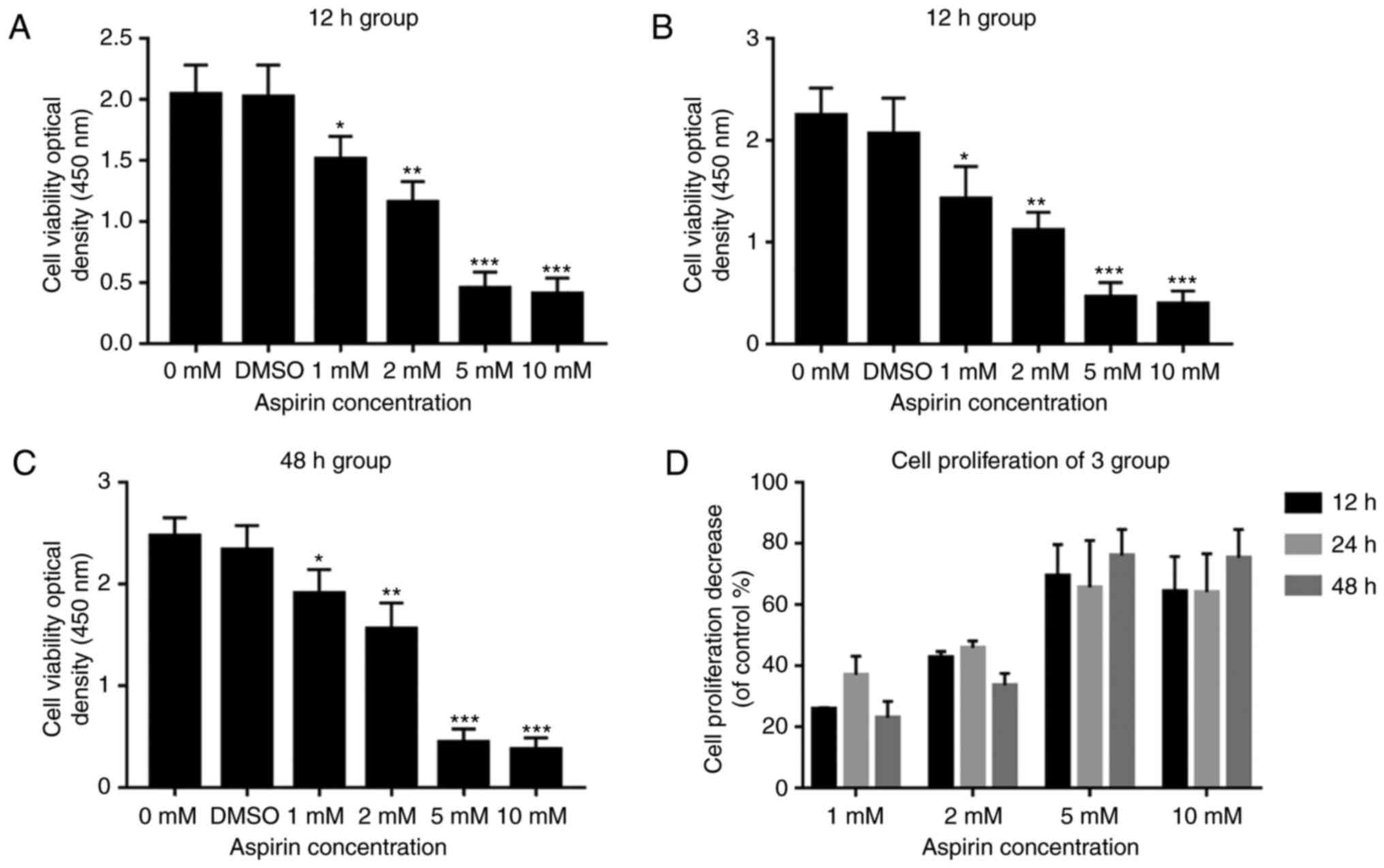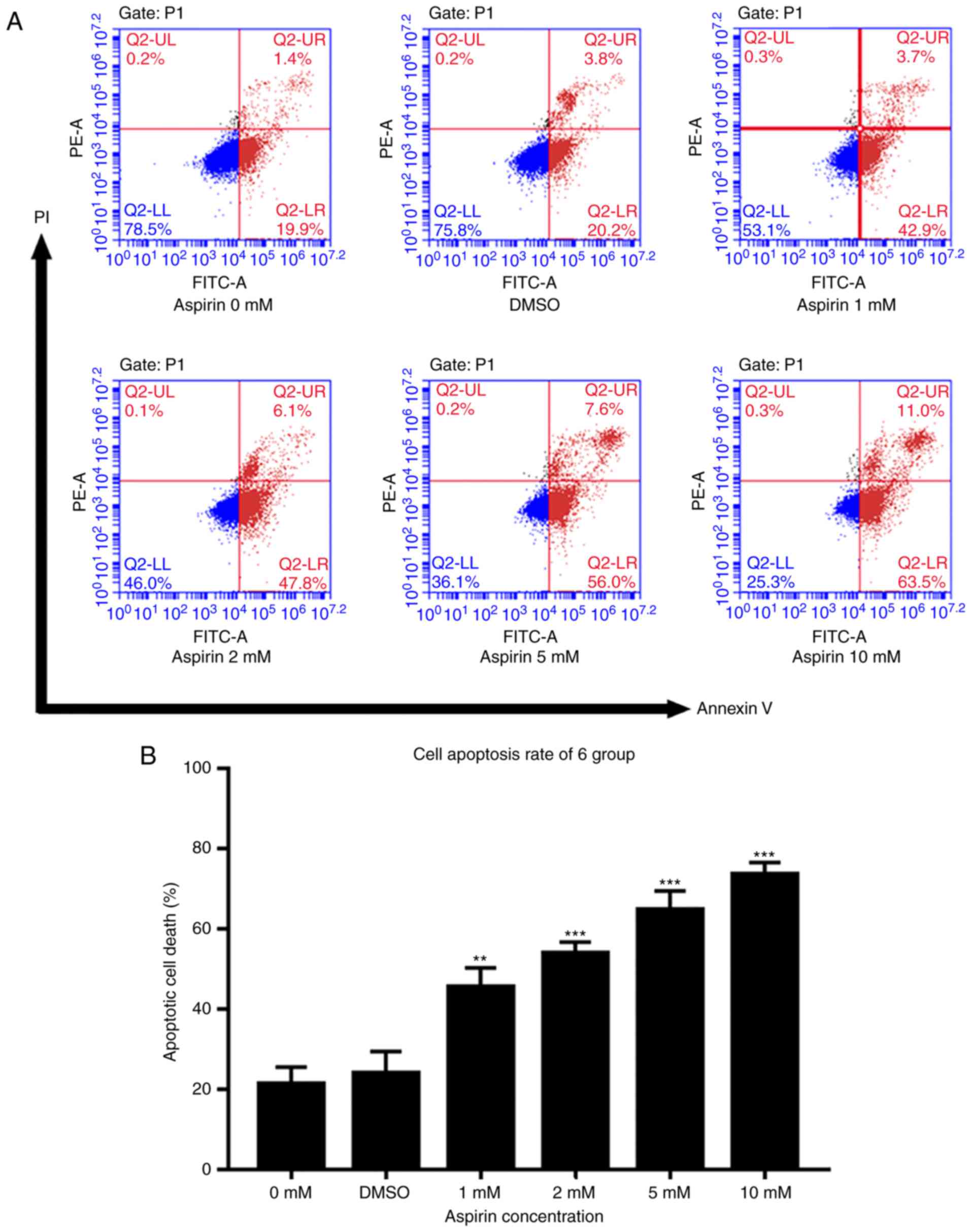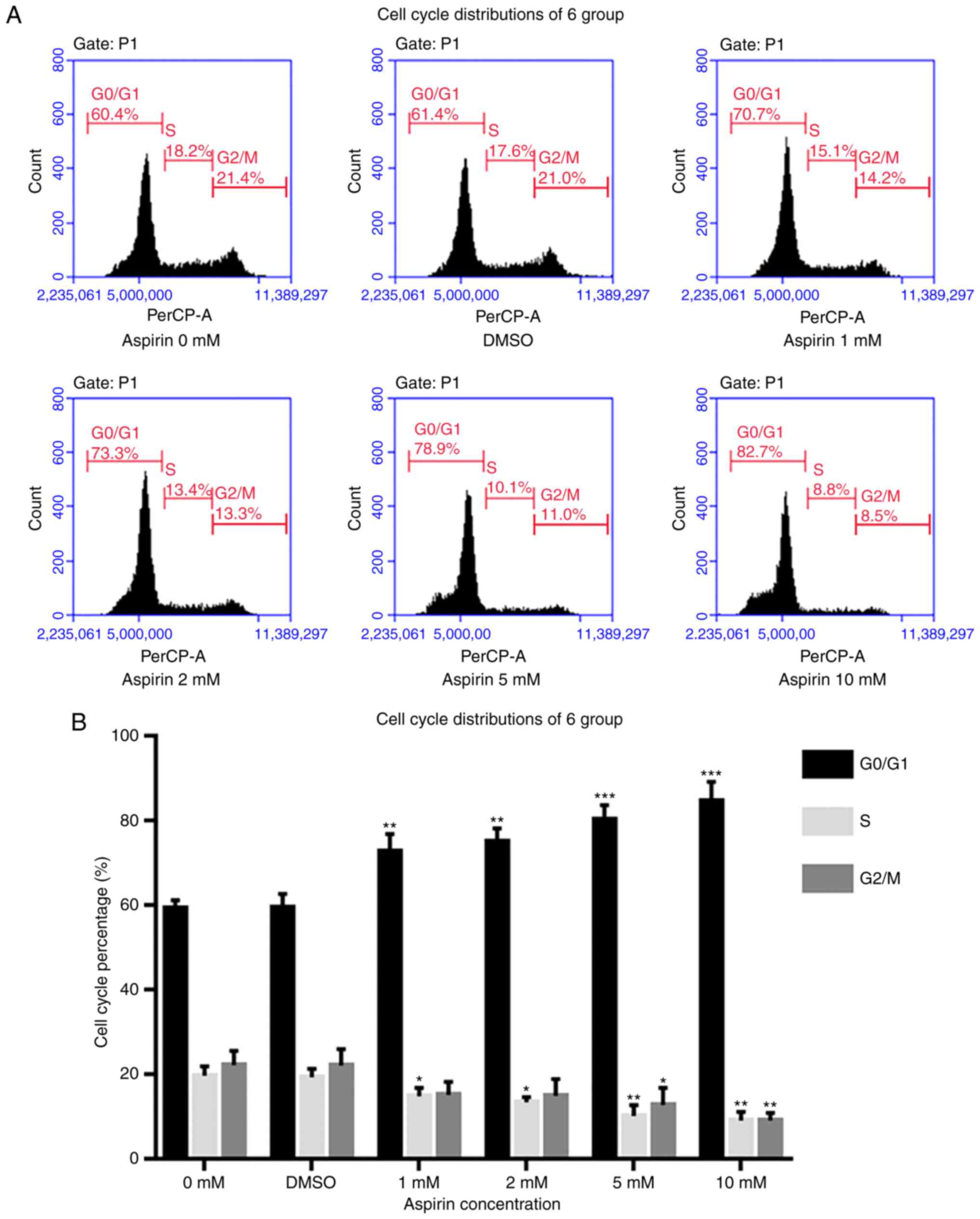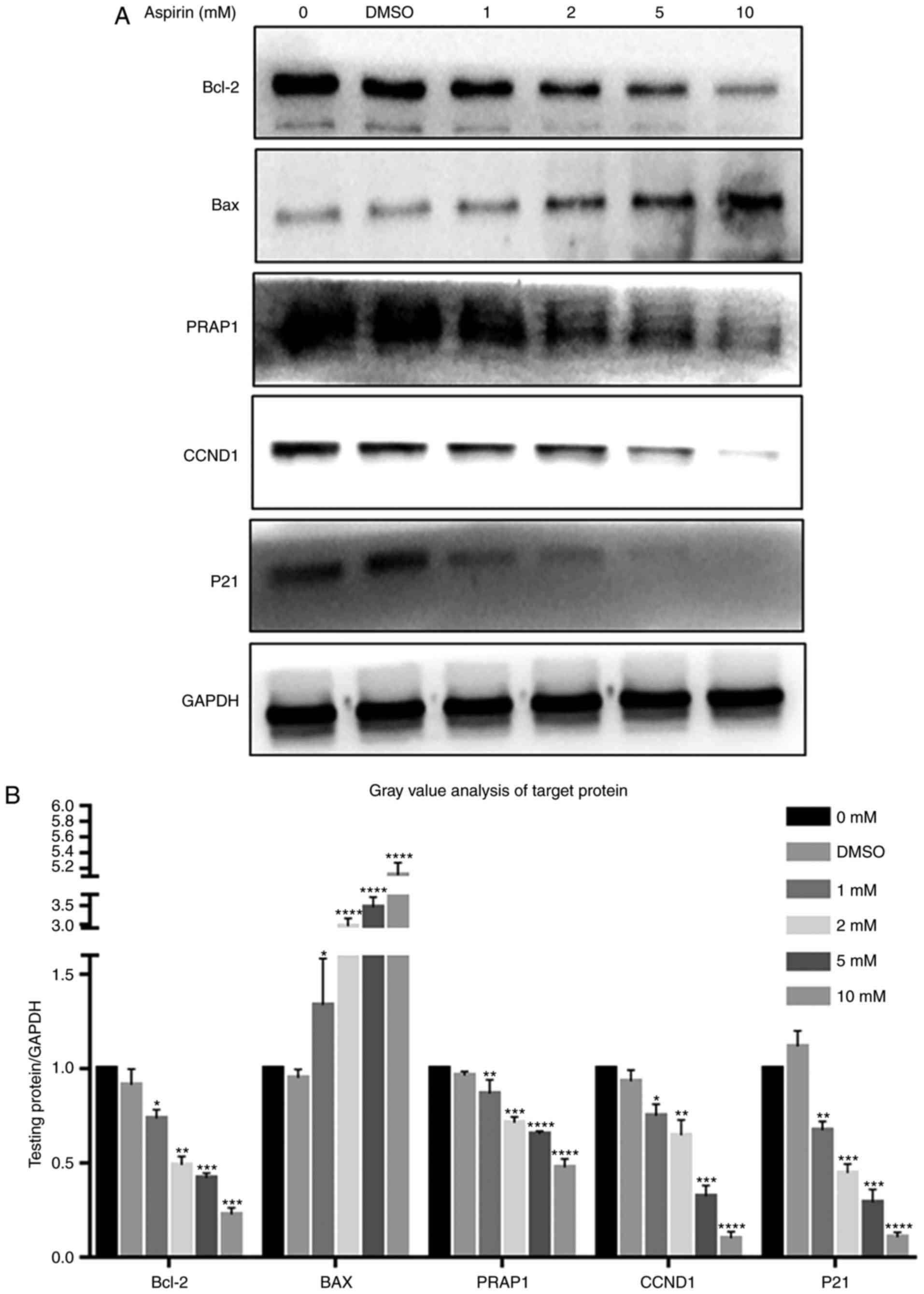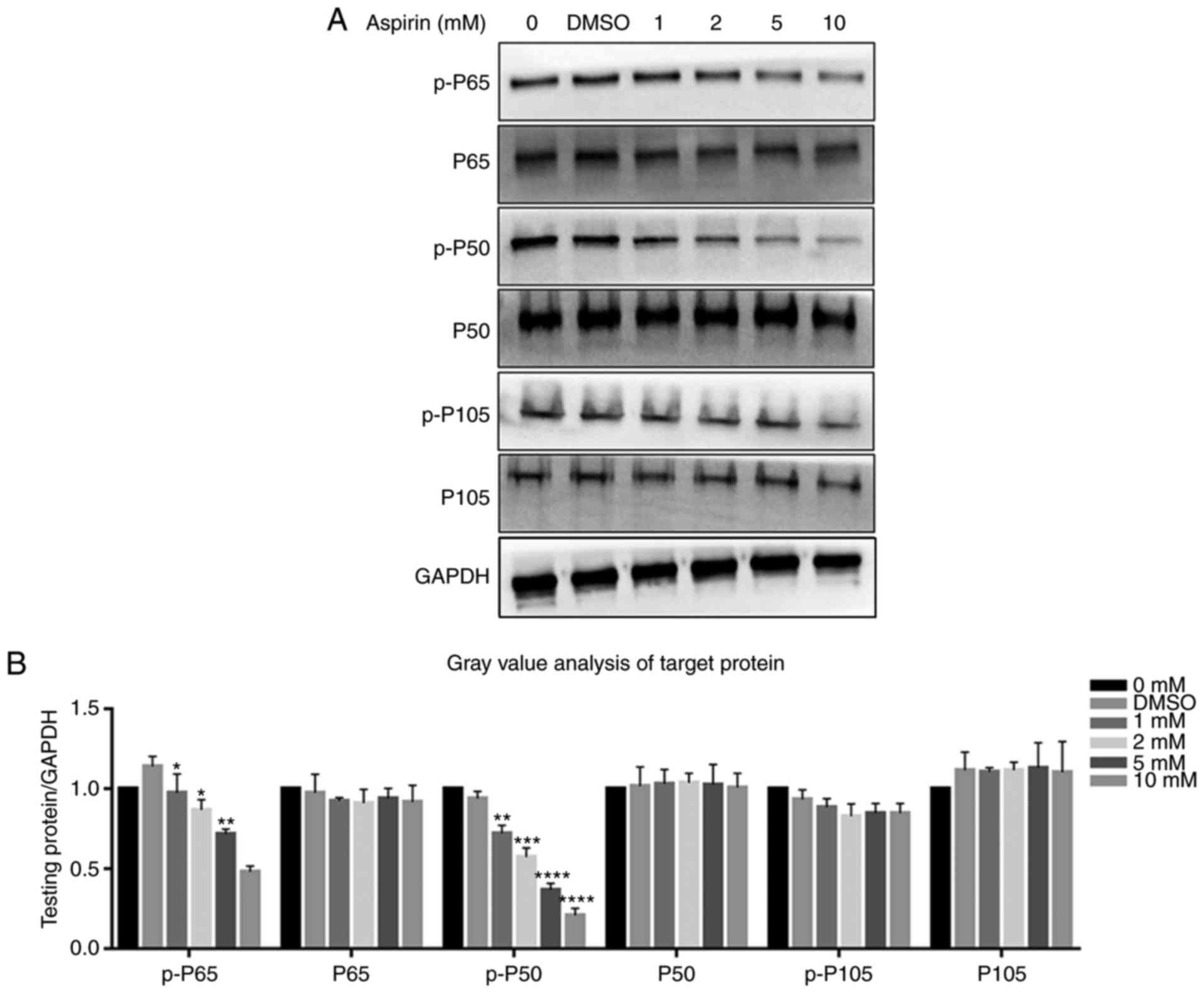|
1
|
Cooles FA and Isaacs JD: Pathophysiology
of rheumatoid arthritis. Curr Opin Rheumatol. 23:233–240. 2011.
View Article : Google Scholar : PubMed/NCBI
|
|
2
|
Müller-Ladner U and Pap T: Pathogenesis of
RA: More than just immune cells. Z Rheumatol. 64:396–401. 2005.In
German. View Article : Google Scholar
|
|
3
|
Pope RM: Apoptosis as a therapeutic tool
in rheumatoid arthritis. Nat Rev Immunol. 2:527–535. 2002.
View Article : Google Scholar : PubMed/NCBI
|
|
4
|
Vane JR and Botting RM: The mechanism of
action of aspirin. Thromb Res. 110:255–258. 2003. View Article : Google Scholar : PubMed/NCBI
|
|
5
|
Yao RS, Rioux N, Castonguay A and You M:
Inhibition of COX-2 and induction of apoptosis: Two determinants of
nonsteroidal anti-inflammatory drugs’ chemopreventive efficacies in
mouse lung tumorigenesis. Exp Lung Res. 26:731–742. 2000.
View Article : Google Scholar
|
|
6
|
Richter M, Weiss M, Weinberger I,
Fürstenberger G and Marian B: Growth inhibition and induction of
apoptosis in colorectal tumor cells by cyclooxygenase inhibitors.
Carcinogenesis. 22:17–25. 2001. View Article : Google Scholar : PubMed/NCBI
|
|
7
|
Yu H, Pardoll D and Jove R: STATs in
cancer inflammation and immunity: A leading role for STAT3. Nat Rev
Cancer. 9:798–809. 2009. View
Article : Google Scholar : PubMed/NCBI
|
|
8
|
Krause A, Scaletta N, Ji JD and Ivashkiv
LB: Rheumatoid arthritis synoviocyte survival is dependent on
Stat3. J Immunol. 169:6610–6616. 2002. View Article : Google Scholar : PubMed/NCBI
|
|
9
|
Makarov SS: NF-kappa B in rheumatoid
arthritis: A pivotal regulator of inflammation, hyperplasia and
tissue destruction. Arthritis Res. 3:200–206. 2001. View Article : Google Scholar
|
|
10
|
Wishart DS, Feunang YD, Guo AC, Lo EJ,
Marcu A, Grant JR, Sajed T, Johnson D, Li C, Sayeeda Z, et al:
DrugBank 5.0: A major update to the DrugBank database for 2018.
Nucleic Acids Res. 46:D1074–D1082. 2018. View Article : Google Scholar :
|
|
11
|
Szklarczyk D, Morris JH, Cook H, Kuhn M,
Wyder S, Simonovic M, Santos A, Doncheva NT, Roth A, Bork P, et al:
The STRING database in 2017: Quality-controlled protein-protein
association networks, made broadly accessible. Nucleic Acids Res.
45:D362–D368. 2017. View Article : Google Scholar
|
|
12
|
Huang da W, Sherman BT and Lempicki RA:
Systematic and integrative analysis of large gene lists using DAVID
bioinformatics resources. Nat Protoc. 4:44–57. 2009. View Article : Google Scholar : PubMed/NCBI
|
|
13
|
Huang da W, Sherman BT and Lempicki RA:
Bioinformatics enrichment tools: Paths toward the comprehensive
functional analysis of large gene lists. Nucleic Acids Res.
37:1–13. 2009. View Article : Google Scholar
|
|
14
|
Kodela R, Chattopadhyay M, Goswami S, Gan
ZY, Rao PP, Nia KV, Velázquez-Martínez CA and Kashfi K: Positional
isomers of aspirin are equally potent in inhibiting colon cancer
cell growth: Differences in mode of cyclooxygenase inhibition. J
Pharmacol Exp Ther. 345:85–94. 2013. View Article : Google Scholar : PubMed/NCBI
|
|
15
|
Hsieh CC, Hernández-Ledesma B and de Lumen
B: Lunasin, a novel seed peptide, sensitizes human breast cancer
MDA-MB-231 cells to aspirin-arrested cell cycle and induced
apoptosis. Chem Biol Interact. 186:127–134. 2010. View Article : Google Scholar : PubMed/NCBI
|
|
16
|
De Luna-Bertos E, Ramos-Torrecillas J,
García-Martínez O, Díaz-Rodríguez L and Ruiz C: Effect of aspirin
on cell growth of human MG-63 osteosarcoma line. Sci World J. 2012.
View Article : Google Scholar
|
|
17
|
Cuzick J, Thorat MA, Bosetti C, Brown PH,
Burn J, Cook NR, Ford LG, Jacobs EJ, Jankowski JA, La Vecchia C, et
al: Estimates of benefits and harms of prophylactic use of aspirin
in the general population. Ann Oncol. 26:47–57. 2015. View Article : Google Scholar :
|
|
18
|
Xiang S, Sun Z, He Q, Yan F, Wang Y and
Zhang J: Aspirin inhibits ErbB2 to induce apoptosis in cervical
cancer cells. Med Oncol. 27:379–387. 2010. View Article : Google Scholar
|
|
19
|
Fries JF, Ramey DR, Singh G, Morfeld D,
Bloch DA and Raynauld JP: A reevaluation of aspirin therapy in
rheumatoid arthritis. Arch Intern Med. 153:2465–2471. 1993.
View Article : Google Scholar : PubMed/NCBI
|
|
20
|
Hsieh TC, Wu ST, Bennett DJ, Doonan BB, Wu
E and Wu JM: lFunctional/activity network (FAN) analysis of
gene-phenotype connectivity liaised by grape polyphenol
resveratrol. Oncotarget. 7:38670–38680. 2016. View Article : Google Scholar : PubMed/NCBI
|
|
21
|
Alshatwi AA: Catechin hydrate suppresses
MCF-7 proliferation through TP53/Caspase-mediated apoptosis. J Exp
Clin Canc Res. 29:1672010. View Article : Google Scholar
|
|
22
|
Clària J, Lee MH and Serhan CN:
Aspirin-triggered lipoxins (15-epi-LX) are generated by the human
lung adenocarcinoma cell line (A549)-neutrophil interactions and
are potent inhibitors of cell proliferation. Mol Med. 2:583–596.
1996. View Article : Google Scholar : PubMed/NCBI
|
|
23
|
Ding JH, Yuan LY, Huang RB and Chen GA:
Aspirin inhibits proliferation and induces apoptosis of multiple
myeloma cells through regulation of Bcl-2 and Bax and suppression
of VEGF. Eur J Haematol. 93:329–339. 2014. View Article : Google Scholar : PubMed/NCBI
|
|
24
|
Kopp E and Ghosh S: Inhibition of Nf-kappa
B by sodium-salicylate and aspirin. Science. 265:956–959. 1994.
View Article : Google Scholar : PubMed/NCBI
|
|
25
|
Shao J, Fujiwara T, Kadowaki Y, Fukazawa
T, Waku T, Itoshima T, Yamatsuji T, Nishizaki M, Roth JA and Tanaka
N: Overexpression of the wild-type p53 gene inhibits NF-kappaB
activity and synergizes with aspirin to induce apoptosis in human
colon cancer cells. Oncogene. 19:726–736. 2000. View Article : Google Scholar : PubMed/NCBI
|
|
26
|
Gay S, Gay RE and Koopman WJ: Molecular
and cellular mechanisms of joint destruction in
rheumatoid-arthritis: Two cellular mechanisms explain joint
destruction. Ann Rheum Dis. 52:S39–S47. 1993. View Article : Google Scholar
|
|
27
|
Huber LC, Distler O, Tarner I, Gay RE, Gay
S and Pap T: Synovial fibroblasts: Key serveers in rheumatoid
arthritis. Rheumatology (Oxford). 45:669–675. 2006. View Article : Google Scholar
|
|
28
|
Pattacini L, Boiardi L, Casali B and
Salvarani C: Differential effects of anti-TNF-alpha drugs on
fibroblast-like synoviocyte apoptosis. Rheumatology (Oxford).
49:480–489. 2010. View Article : Google Scholar
|
|
29
|
Yang C, Liu J, Wang YX, Tong JJ, Wu YH and
Liu Y: Aspirin inhibits the proliferation of canine mammary gland
tumor cells in vitro and in vivo. Transl Cancer Res. 6:188–197.
2017. View Article : Google Scholar
|
|
30
|
Stark LA, Din FVN, Zwacka RM and Dunlop
MG: Aspirin-induced activation of the NF-kappaB signaling pathway:
A novel mechanism for aspirin-mediated apoptosis in colon cancer
cells. Faseb J. 15:1273–1275. 2001. View Article : Google Scholar : PubMed/NCBI
|
|
31
|
Wang J, Yuan L, Xiao HF, Xiao CX, Wang YT
and Liu XB: Momordin Ic induces HepG2 cell apoptosis through MAPK
and PI3K/Akt-mediated mitochondrial pathways. Apoptosis.
18:751–765. 2013. View Article : Google Scholar : PubMed/NCBI
|
|
32
|
Fulda S and Debatin KM: Extrinsic vs.
intrinsic apoptosis pathways in anticancer chemotherapy. Oncogene.
25:4798–4811. 2006. View Article : Google Scholar : PubMed/NCBI
|
|
33
|
Wang Y, Li X, Wang XL, Lau W, Wang Y, Xing
Y, Zhang X, Ma X and Gao F: Ginsenoside Rd attenuates myocardial
ischemia/reperfusion injury via Akt/GSK-3β signaling and
inhi-bition of the mitochondria-dependent apoptotic pathway. PLoS
One. 8:e709562013. View Article : Google Scholar
|
|
34
|
Hunter T: Braking the cycle. Cell.
75:839–841. 1993. View Article : Google Scholar : PubMed/NCBI
|
|
35
|
Fan WS, Li JH, Chen JF, Zhu L, Wang Y, Sun
B, Hua B, Guo C and Yan Z: Aspirin inhibits the proliferation of
synovium-derived mesenchymal stem cells by arresting the cell cycle
in the G0/G1 phase. Am J Transl Res. 9:5056–5062. 2017.PubMed/NCBI
|
|
36
|
Ou YQ, Zhu WB, Li Y, Qiu PX, Huang YJ, Xie
J, He SM, Zheng XK, Leng TD, Xu D and Yan GM: Aspirin inhibits
proliferation of gemcitabine-resistant human pancreatic cancer
cells and augments gemcitabine-induced cytotoxicity. Acta Pharmacol
Sin. 31:73–80. 2010. View Article : Google Scholar
|
|
37
|
Liu Y, Martindale JL, Gorospe M and
Holbrook NJ: Regulation of p21WAF1/CIP1 expression through
mitogen-activated protein kinase signaling pathway. Cancer Res.
56:31–35. 1996.PubMed/NCBI
|
|
38
|
Lloyd RV, Erickson LA, Jin L, Kulig E,
Qian X, Cheville JC and Scheithauer BW: p27kip1: A multifunctional
cyclin-dependent kinase inhibitor with prognostic significance in
human cancers. Am J Pathol. 154:313–323. 1999. View Article : Google Scholar : PubMed/NCBI
|
|
39
|
Sherr CJ: The Pezcoller lecture: Cancer
cell cycles revisited. Cancer Res. 60:3689–3695. 2000.PubMed/NCBI
|
|
40
|
Agus DB, Cordon-Cardo C, Fox W, Drobnjak
M, Koff A, Golde DW and Scher HI: Prostate cancer cell cycle
regulators: Response to androgen withdrawal and development of
androgen independence. J Natl Cancer Inst. 91:1869–1876. 1999.
View Article : Google Scholar : PubMed/NCBI
|
|
41
|
Liu JX, Fei D, Xing J and Du J:
MicroRNA-29a inhibits proliferation and induces apoptosis in
rheumatoid arthritis fibroblast-like synoviocytes by repressing
STAT3. Biomed Pharmacother. 96:173–181. 2017. View Article : Google Scholar : PubMed/NCBI
|
|
42
|
Guo H, Liu J, Ben Q, Qu Y, Li M, Wang Y,
Chen W and Zhang J: The aspirin-induced long non-coding RNA OLA1P2
blocks phosphorylated STAT3 homodimer formation. Genome Biol.
17:242016. View Article : Google Scholar : PubMed/NCBI
|
|
43
|
Wang W, Sun W and Jin L: Caffeic acid
alleviates inflammatory response in rheumatoid arthritis
fibroblast-like synoviocytes by inhibiting phosphorylation of IκB
kinase α/β and IκBα. Int Immunopharmacol. 48:61–66. 2017.
View Article : Google Scholar : PubMed/NCBI
|
|
44
|
Ni S, Miao K, Zhou X, Xu N, Li C, Zhu R,
Sun R and Wang Y: The involvement of follistatin-like protein 1 in
osteoarthritis by elevating NF-κB-mediated inflammatory cytokines
and enhancing fibroblast like synoviocyte proliferation. Arthritis
Res Ther. 17:912015. View Article : Google Scholar
|
|
45
|
Kim SK, Park KY, Yoon WC, Park SH, Park
KK, Yoo DH and Choe JY: Melittin enhances apoptosis through
suppression of IL-6/sIL-6R complex-induced NF-κB and STAT3
activation and Bcl-2 expression for human fibroblast-like
synoviocytes in rheumatoid arthritis. Joint Bone Spine. 78:471–477.
2011. View Article : Google Scholar : PubMed/NCBI
|
|
46
|
Chen JY and Stark LA: Aspirin prevention
of colorectal cancer: Focus on NF-κB signalling and the nucleolus.
Biomedicines. 5:E432017. View Article : Google Scholar
|
|
47
|
Guesmi F, Prasad S, Tyagi AK and Landoulsi
A: Antinflammatory and anticancer effects of terpenes from oily
fractions of Teucruim alopecurus, blocker of IκBα kinase, through
downregulation of NF-κB activation, potentiation of apoptosis and
suppression of NF-κB-regulated gene expression. Biomed
Pharmacother. 95:1876–1885. 2017. View Article : Google Scholar : PubMed/NCBI
|
|
48
|
Zhang P, Wu C, Huang XH, Shen CL, Li L,
Zhang W and Yao CZ: Aspirin suppresses TNF-α-induced MMP-9
expression via NF-κB and MAPK signaling pathways in RAW264.7 cells.
Exp Ther Med. 14:5597–5604. 2017.PubMed/NCBI
|















